We use necessary cookies that allow our site to work. We also set optional cookies that help us improve our website.
For more information about the types of cookies we use, and to manage your preferences, visit our Cookies policy here.

As children return to school, how can author visits safely return to the classroom too?
25 Sep 2020
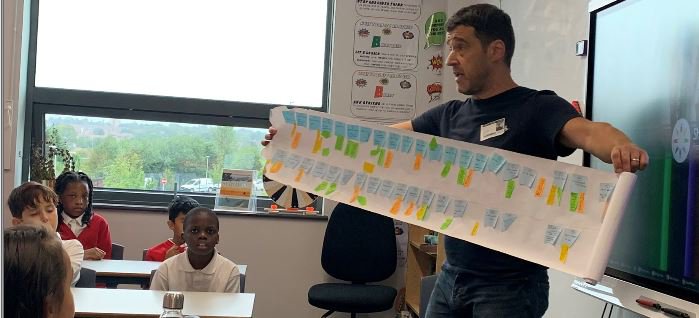
Children’s author Tom Palmer shares his experience of returning to schools and his top tips for schools and authors who are thinking about arranging a visit this term.
COVID-19 presents huge and unprecedented challenges to schools and authors alike. One of the many things schools have to consider carefully is visits from outsiders, while for authors like me, school visits can be crucial to their livelihoods.
There are fantastic benefits to introducing children to a diverse range of inspiring people as it can really broaden their horizons. And – in my opinion – authors are great for that. Research from the National Literacy Trust also shows that author visits can encourage pupils’ enjoyment of reading and writing, build their reading and writing confidence and skills, and support the school’s teaching of the English curriculum.
So, how can authors and schools work together to provide children with safe and engaging visits at this unique time?
As a children’s author, a vital part of making a living is delivering engaging school visits and interactive sessions. After four months out of the game, I have been lucky that, in the first two weeks of this term, three brilliant primary schools have already welcomed me in. Without school visits, I could not make a living as an author. Things are looking pretty shaky for me. Things are looking catastrophic for other authors I know. I’ve already started applying for jobs outside children’s books.
Having visited three schools this term, I wanted to share my experiences to encourage schools and authors to keep working together to bring the magic of author visits to children, if not in person, then virtually.
It begins with planning and communication.
It was vital for the schools and I to work together to plan the visit. After our conversations, we all knew what to expect from each other and understood that all parties needed to be flexible on the day.
Ahead of my latest visit, Shakespeare Primary School in Leeds sent me their policy on hand hygiene, social distancing, moving around their spacious corridors and use of the toilet and other facilities. They also shared their Covid-19 policies to make sure everything was going to be adhered to. They gave me very detailed instructions about where and when to arrive and were there to greet and guide me when I did.
At Grasmere Primary School we held the session in a temporary marquee the school has had erected in its grounds to create more space for the children to meet visitors – and do other activities – without crowding the school, which has limited space. In line with their policies, masks were worn at specific times, hand sanitiser used regularly and everyone social distanced.
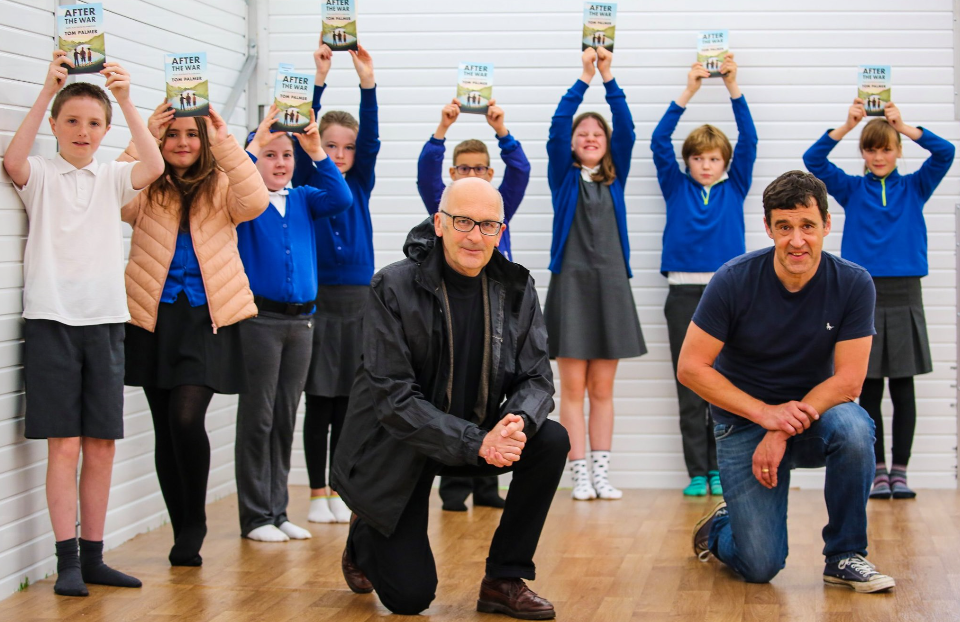
On the day of the visit, everyone did what was expected of them.
Even before I entered the three schools, I immediately sensed that the children, parents and staff found social distancing, using hand gel and wearing masks normal. There was respect and courtesy in the corridors and doorways. No sense of chaos. Zero anxiety.
Knowing the three schools’ rules in advance, I was able to play my part in their new systems. Within a couple of minutes I was at ease and in the groove doing what I was there for: inspiring young writers and encouraging reading for pleasure at a safe distance.
In the classrooms, if I was uncertain about what to do at any time, I would stop and seek clarification from the teachers who were happy to help. As did the children in some cases! This already felt very normal and everybody was really patient with each other.
Shakespeare Primary school had staggered lunches and breaks, so the staffroom also felt quiet and safe during my breaks. Back in the corridors, I moved from class to class, using hand gel in between and keeping a safe distance from others, wearing a mask when it was appropriate to do so in line with school policy.
Throughout, the guidelines I followed made me feel safe as well as the children.
It felt brilliant to be on a school visit again!
It was wonderful and completely refreshing just to talk to and listen to children who are enthusing about books and about expressing themselves in writing. I think authors need to meet their readers to help them write. I’ve not been into a school for six months and my writing has suffered as a result. I’ve missed running ideas by the kids, testing how they’ll react to a scene or a character. And – frankly – being there made me happy. Spending time with children is good for you.
I think the feeling was mutual. At Green Howarth C of E Primary School in Lancashire, the teacher said: “We had an excellent time on Friday, the children were buzzing about both reading and writing which is wonderful. The atmosphere was fantastic and I would recommend a visit from Tom to anyone and everyone - I already have!”
In addition, I am thrilled to have earned two full days' fee for the first time in months. Grasmere Primary School actually helped me write ‘After the War’ so it was great to see them again.
The children responded to all three visits just as they always do. They were enthusiastic, creative and funny. Aside from safe distancing, the energy was no different to pre-COVID times once we got going. Even though I had a table in between me and the children most of the time and I wasn’t going round the class to have one-to-one chats, it felt normal. It was a joy.
For most of my sessions I chatted and took questions from the front of the class. For the interactive part, I enlisted the teachers’ help.
For Grasmere Primary School in Cumbria, I signed copies of my books in advance and boxed them for three days, then at Green Haworth C of E Primary School, I signed the books – having used hand gel – and the children were told they’d be given them in three days’ time.
Virtual visits
I – and many authors – have been doing virtual visits for months. I did them throughout April to July and am also doing them now. I’ve done Q&As, writing workshops, readings and more.
Whilst I think a virtual visit may have less of an impact than an author visit in person, as we have found with our families over lockdown, as much as we would like to see them in person, it is still great to see them via the screen. So I think it’s worth having an author visit virtually if a school is unable to welcome an author in.
Please do consider a virtual visit if you are a school that is unable to have visitors in.
My top tips for authors who would like to run school visits this term
- Contact schools local to you or that you have worked with before and send them a list of what you can do, when you can do it, how you have adapted your work in line with current measures and how much you charge.
- If you’re doing virtual visits, become au fait with platforms like Zoom, Microsoft Teams and others. Practise using them so that you can not only talk live, but show images and more.
- Be flexible about everything.
My top tips for schools who would like to arrange author visits this term
- If you don’t have an author in mind, or one you regularly work with, check out this list of authors and storytellers on the National Literacy Trust’s website to see what authors can do for you and where they are based
- Talk to your chosen author in advance about your school’s safety policies to make sure you’re both happy with a school visit in person or, failing that, online.
- Speak to the author and your local book store about facilitating bookselling. The author will be thrilled to sign copies of their books.
To find an author or storyteller near your school, visit the National Literacy Trust’s website .
To find out more about the benefits of author and writer visits to schools for children’s literacy engagement, read the National Literacy Trust’s latest research report .
Tom Palmer is the author of 50 children’s books, including football series for Puffin and history fiction for Barrington Stoke. His best known books are Football Academy , Armistice Runner and his recent story about a group of Holocaust survivors , After the War .
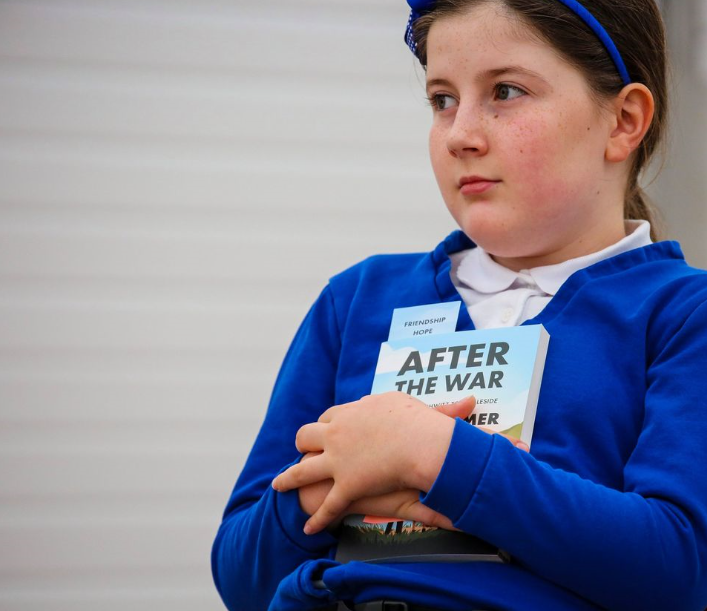
Share this article

- News & Calendar
Top author Tom Palmer visits HVC
Published on 13/02/20

Tom Palmer, top children’s author, visits Hope Valley College to spend a day with Year 7 and 8 students.
After months of planning and a contorted four-hour train journey from Halifax, the long-awaited Tom Palmer, top children’s author, arrived at Hope Valley College to spend a day with Year 7 and 8 students. And it was well worth the wait. Tom got straight to work, immediately getting students hooked with tales of how he learned to enjoy reading, how he began to write, how it took him twenty years to get published and how he now has more than forty highly popular and acclaimed published titles.
Tom involved the students throughout his talk, asking questions and getting lots of questions back, often about fame and fortune (“Are you a millionaire?” and “When you go to a cafe, do you get free drinks?”) He got them thinking, posing ethical dilemmas to get them fired up – would you go to war to avenge the death of someone close to you? – is it right to use animals in war? And he talked about his books – commercially successful sports stories, heavily researched historical stories, scary stories written after giving himself the creeps, and more recently, critically acclaimed stories which have won him awards and plaudits. His latest book, not yet published but very nearly there, and making an appearance at HVC as a well-thumbed wodge of A4 sheets, follows a group of children who survive the Holocaust and are resettled in the Lake District.
Students were able to buy copies of his books, and did, and Tom signed them personally. Y8 Jack, who won the pre-visit Tom Palmer quiz, chose Foul Play as his prize and had it specially inscribed by the author.
Towards the end of the morning, Tom worked with a small group of Year 8s, combining football and reading in a game which culminated in a noisy penalty shootout, goal celebrations and a trophy for the winning team. Then to a much calmer lunch in the library with a select bunch of Accelerated Reader ‘Word
Millionaires’, a certain amount of cake, and finally a mad dash to meet another train en route to his next school visit in the Midlands.
It was a brilliant day, much enjoyed by all, including Tom. Reluctant readers were inspired, keen readers were enthused, Tom got us all listening and thinking, and made some of us want to be writers. What more can you ask from an author visit?

A huge thanks to popular children’s author, Tom Palmer, who visited us yesterday and received a warm welcome from our Year 7 students.
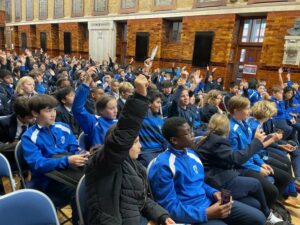
Tom’s latest book, Resist, was just published in August. It is the fascinating story of the Dutch Resistance in World War II and inspired by the true story of Audrey Hepburn’s role in the Resistance as a girl – before she became a film legend.
At the end, students had an opportunity to have Tom sign their books.

Author: carolineroberts
Related articles, quintin hogg memorial ground update – the latymer orchard.
An Oasis for Nature and Biodiversity. Our latest Quintin Hogg Memorial Ground update features the wonderful and dedicated Latymer...
Easter Classics Trip 2024
Over the Easter holidays, our students and staff had a successful Classics trip through the heart of Ancient...
Hamburg Easter 2024
During the Easter holidays, our German department and our students travelled to Hamburg to stay with families as part...
- WordPress.org
- Documentation
- Learn WordPress

- Staff & Pupil Login
- Head’s Welcome
- Our Approach
- Our Foundation
- News & Events
- Staff & Governors
- Careers at King’s
- Information & Policies
- Pre-Prep (Rec–2)
- Juniors (Years 3-4)
- Seniors (Years 5-8)
- School Uniform
- Life after King’s
- King’s Choristers
- Chorister FAQ
- Become a King’s Chorister
- Schola Cantorum
- Arrange a Visit
- Admissions Process and Availability of Places
- Fees and Bursaries
- Registration
- Timing of the School Day and Holiday Camps
- School transport
NEWS & EVENTS
Author tom palmer visits king’s.
Oct, 2023 | News
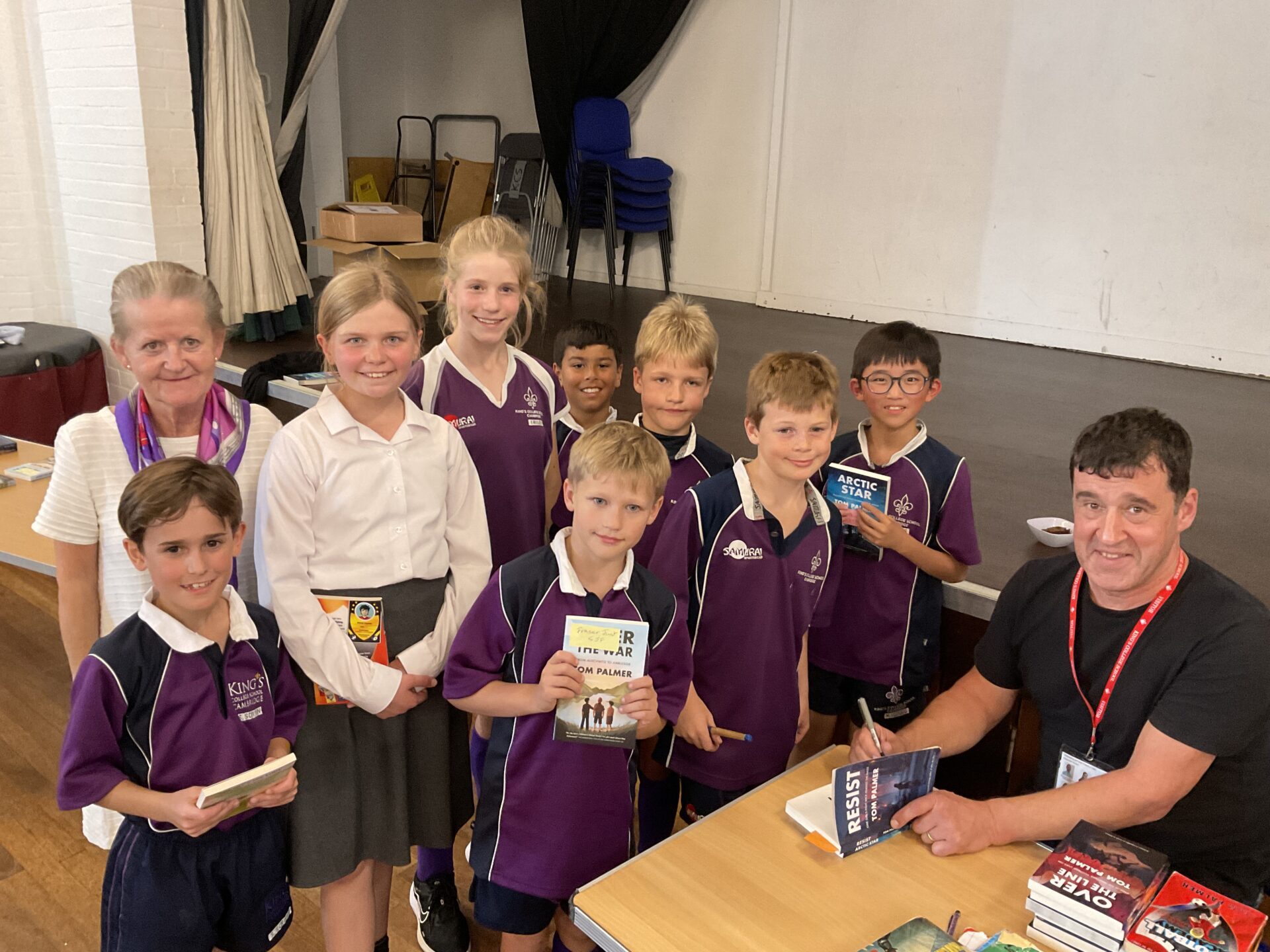
On Friday, King’s welcome the acclaimed author Tom Palmer to talk to the pupils in Years 3-6. It was an inspiring afternoon, where pupils listened to Tom’s tales of how he got into writing, despite initially being a reluctant reader himself. Everyone was enthralled by his tales of how he got into writing, by writing about what he loved: football, and latterly, history. The pupils were thrilled to meet Tom and get their books signed, before scurrying off to begin reading them.
Hopefully many of the pupils who listened to Tom speak will feel inspired to read more of his books and even think about writing themselves. As Mrs Day said, it was a wonderful experience for us all to meet a real, live author, especially one as humble at Tom Palmer.

You're getting a free audiobook.
Best sellers.

After the War
- From Auschwitz to Ambleside
- By: Tom Palmer, Violet Tobacco
- Narrated by: Joe Jameson
- Length: 3 hrs and 7 mins
- Overall 0 out of 5 stars 0
- Performance 0 out of 5 stars 0
- Story 0 out of 5 stars 0
Master storyteller Tom Palmer returns with a deeply moving and beautifully told novel of friendship and belonging, inspired by the incredible true story of the Windermere Boys....
- By: Tom Palmer , Violet Tobacco
- Release date: 10-03-22
- Language: English
- Not rated yet
Failed to add items
Add to cart failed., add to wish list failed., remove from wishlist failed., adding to library failed, follow podcast failed, unfollow podcast failed.
Regular price: $10.84 or 1 credit
Sale price: $10.84 or 1 credit

Soccer Diaries Series #1, The Soccer Diaries, Book 1
- Rocky Takes L.A.
- By: Tom Palmer
- Narrated by: Lucy Brownhill
- Length: 3 hrs and 20 mins
Rocky Race is not your average fourteen-year-old. She's determined, ambitious, and the best football player you've ever seen. So, when she gets a once-in-a-lifetime opportunity to attend a prestigious soccer camp in California, United States, she takes it....
- Series: Soccer Diaries , Book 1
- Release date: 12-26-23
Regular price: $9.45 or 1 credit
Sale price: $9.45 or 1 credit

- One Girl's Fight Back Against the Nazis
- By: Tom Palmer, Tom Clohosy Cole
- Narrated by: Anna Gilthorpe
- Length: 2 hrs and 35 mins
What can one girl do to fight back against the Nazis? Multi-award-winning author Tom Palmer shines a light on life under wartime occupation, in a beautifully told story inspired by the childhood of Hollywood legend Audrey Hepburn.
- By: Tom Palmer , Tom Clohosy Cole
- Release date: 05-31-23
Regular price: $6.53 or 1 credit
Sale price: $6.53 or 1 credit

Over the Line
- By: Tom Palmer, Violet Tobacco, Ollie Cuthbertson - illustrator
- Narrated by: Joe Eyre
- Length: 4 hrs and 41 mins
Can Jack and his teammates survive the horrors of war to get the chance to play football again? A stunning edition of Tom Palmer's bestselling novel based on the true story of WWI war hero and footballing legend Jack Cock.
- By: Tom Palmer , Violet Tobacco , Ollie Cuthbertson - illustrator
- Series: Conkers
- Release date: 05-09-24
Regular price: $14.18 or 1 credit
Sale price: $14.18 or 1 credit

Angel of Grasmere
- From Dunkirk to the Fells
- By: Tom Palmer, Tom Clohosy Cole - illustrator
- Narrated by: Elaine Fellows
- Length: 5 hrs and 32 mins
Tarn grapples with the loss of her brother at Dunkirk as she faces the threat of Nazi invasion in the Cumbrian countryside in this gripping wartime tale from Tom Palmer.
- By: Tom Palmer , Tom Clohosy Cole - illustrator
Regular price: $16.35 or 1 credit
Sale price: $16.35 or 1 credit

Arctic Star
Multi-award-winning author Tom Palmer returns with a thrilling naval adventure inspired by the incredible history of the Second World War Arctic convoys.

- Narrated by: Frazer Hadfield
- Length: 2 hrs and 31 mins
On 6 June 1944, Emile Corteil parachuted into France with his dog, Glen – and Jack is determined to discover their fate … Master storyteller Tom Palmer returns with a touching celebration of the heroic paratroopers of WWII and their parachuting canine companions.

Armistice Runner
- Narrated by: Flora Ogilvy
- Length: 3 hrs and 19 mins
Tom Palmer celebrates the unsung athletic heroes of the Armistice in a powerful intergenerational tale of the fell-running messengers on the front-line of war.
Regular price: $14.51 or 1 credit
Sale price: $14.51 or 1 credit
Listeners also enjoy

T.Z. Layton

Emma Carroll

Andrew Clements

Mike Lupica
Are you an author.
- Help Center
- Redeem promo code
- About Audible
- Business Inquiries
- Audible in the News
- Accessibility
- ACX for Creators
- Bestsellers
- New York Times Best Sellers
- New releases
- Non-English Audiobooks
- Latino & Hispanic Voices
- Audible in Chinese
- How to listen
- Listen on Apple Devices
- Listen in the car
- Whispersync for Voice
- Advertise with us
- Cumbria Crack app

- Carlisle United
- Send us a sport report
- What’s on
- Get our app

Bestselling children’s author, Tom Palmer visits Grasmere School

Bestselling children’s author and Carnegie Medal 2020 nominee Tom Palmer visited Grasmere School this week. Tom had asked if the children would like to work with him on the draft of his new book ‘After the War’.
He gave them exclusive access to the manuscript, and then visited school to hear their opinions.
Head teacher Jo Goode said ‘This was an amazing opportunity. Tom is a brilliant author and a very humble man. He listened very carefully to the children’s contributions and ideas, and scribbled them all down as fast as he could. The children had lots to say, as this is a very powerful book. It’s the story of some of the children who survived the Holocaust and came to Calgarth Estate in Windermere.
Tom really wanted the children to help him with the balance of the book. How much background information did they think was needed? How tragic should he make it?

The children had strong opinions on all the questions asked, and were surprisingly mature in their empathy.
It was a really fascinating session, in which children were debating and discussing with each other – pointing out potential inconsistencies in plotting; analysing why particular passages were so moving, or horrific; theorising about a potential sequel.
Trevor Avery from the Lake District Holocaust Project also came to the session.
His incredible knowledge about the Jewish children who came to Calgarth has been the barometer for Tom when writing this novel. All the events in the novel are real experiences, which Tom has learnt about from Trevor, although the characters are fictional composites.
Tom Palmer said: “The children at Grasmere have helped massively with the book I am writing about the Holocaust survivors who came to Windermere in 1945. They gave me new ideas. They helped me choose what scenes to take out and keep in.
“And – most of all – their intelligent and sensitive response to the story of those refugees from 74 years ago gave me the confidence I need to keep writing After the War.”
Carnegie Medal 2020 nominee Tom Palmer is originally from Leeds and credits articles about football with getting him into reading as a child. As well as writing the top selling Football Academy and Foul Play series (Puffin), he has also written many books for Barrington Stoke including Armistice Runner, Over the Line, Ghost Stadium, Secret FC, and the Rugby Academy and Wings series. He has been shortlisted for prizes including the Blue Peter Book Award and the Lancashire and Coventry Book Awards. Rugby Academy: Combat Zone is featured in the Scottish First Minister’s Reading Challenge. He travels all over the UK for events, performing his immensely popular rugby and football reading games, and is well-loved across the book trade.
Man arrested in Kendal assault probe
Submarine piece moved to barrow shipyard, have you read.

Everest Base Camp trek in aid of St Mary’s Hospice

Cumbrian author to launch novel this weekend

Plans for new Spar store and petrol station in Lake District village

Warning as ash dieback appears in Cumbria

Arrests after Just Stop Oil protestors take action at Cumbrian MP’s office

Teen banned from Carlisle United matches for three years

Subscribe to Our Newsletter
Subscribe to our mailing list to receive daily updates direct to your inbox!
*We hate spam as much as you do. Privacy Statement
Check your inbox or spam folder to confirm your subscription.

Friends of the Lake District volunteers recognised for their efforts
Volunteers for landscape charity Friends of the Lake District were rewarded at a special awards event at the Windermere Jetty...

Executive assistant for Tim Farron MP and Westmorland Furness & Eden Liberal Democrats

Why is Whitehaven’s water still orange? Here’s what we know so far

Emergency services called to Carlisle house fire

Investigation launched after man assaults woman on bus

Charnock Richard still on course to deny Kendal Town play-off place

33 Middlegate Penrith Cumbria CA11 7SY
Phone: 01768 862313 Email: [email protected]
Registered in England as Barrnon Media Limited. No: 12475190 VAT registration number: 343486488
Useful links
- Send a sport report
Follow us on
© Barrnon Media Limited 2023

- Business Crack
- Send us a sports report
- Terms & Conditions
© 2024 JNews - Premium WordPress news & magazine theme by Jegtheme .
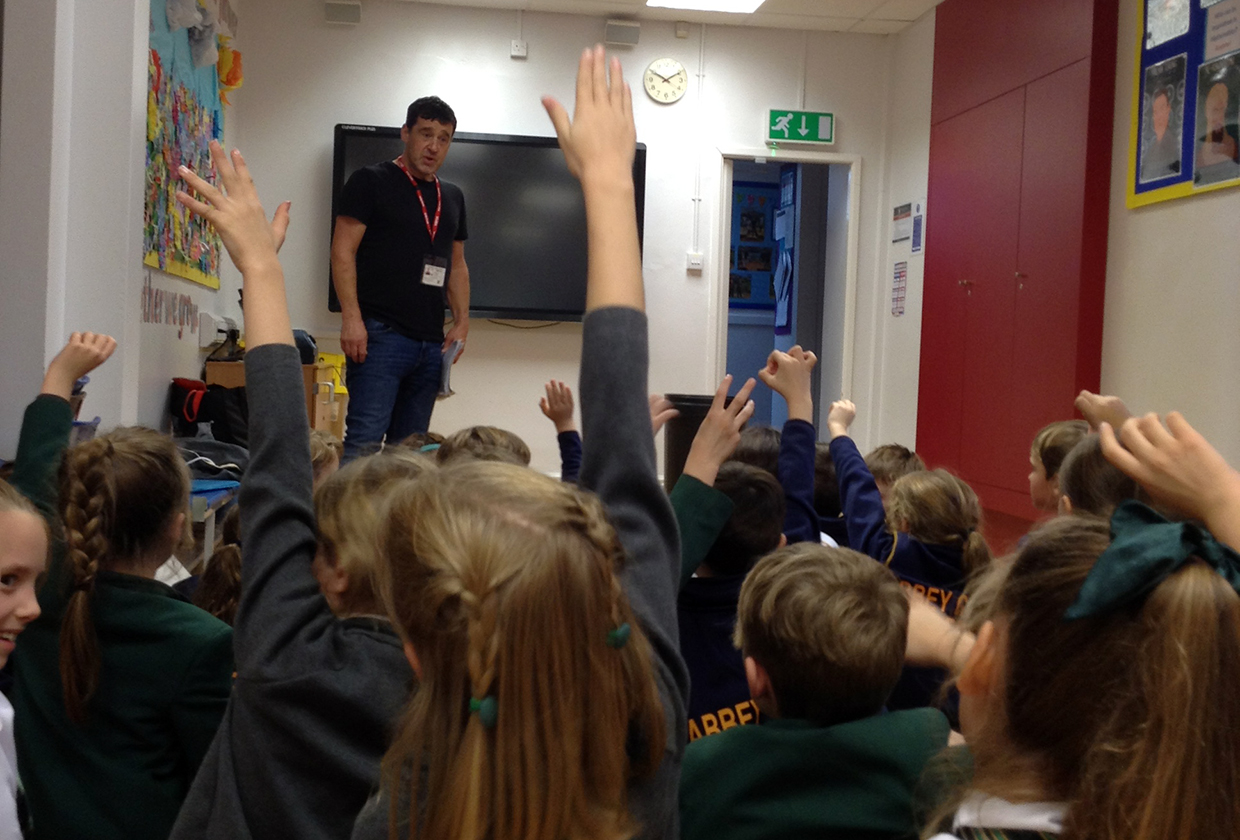
The amazing author, Tom Palmer visited our Infant and Junior School on Thursday 20 October.
Tom is the author of 57 books for children including three Puffin series, as well as books for Barrington Stoke (which are dyslexia friendly and promote reading for all).
Tom is Winner of the FCBG Children’s Book Award, thrice nominated for the CILIP CARNEGIE MEDAL and is the winner of 25 UK book prizes. Tom was also the recipient of the 2019 National Literacy Trust’s Ruth Rendell Award for Services to Literacy.
Tom’s workshops with the children were fantastic and gave the children a real insight into aspects of being an author. J5 and J6 explored how to plan, research and write fictional stories about real historical events including those from Second World War.
J3 and J4 investigated reading for pleasure with a football and quiz twist!
Children delved into the enjoyment we gain from reading newspapers, websites, magazines, fiction, and non-fiction and explored how this can inspire us to write.
We are hoping to develop further links with Tom and know the children found his sessions incredibly inspiring.
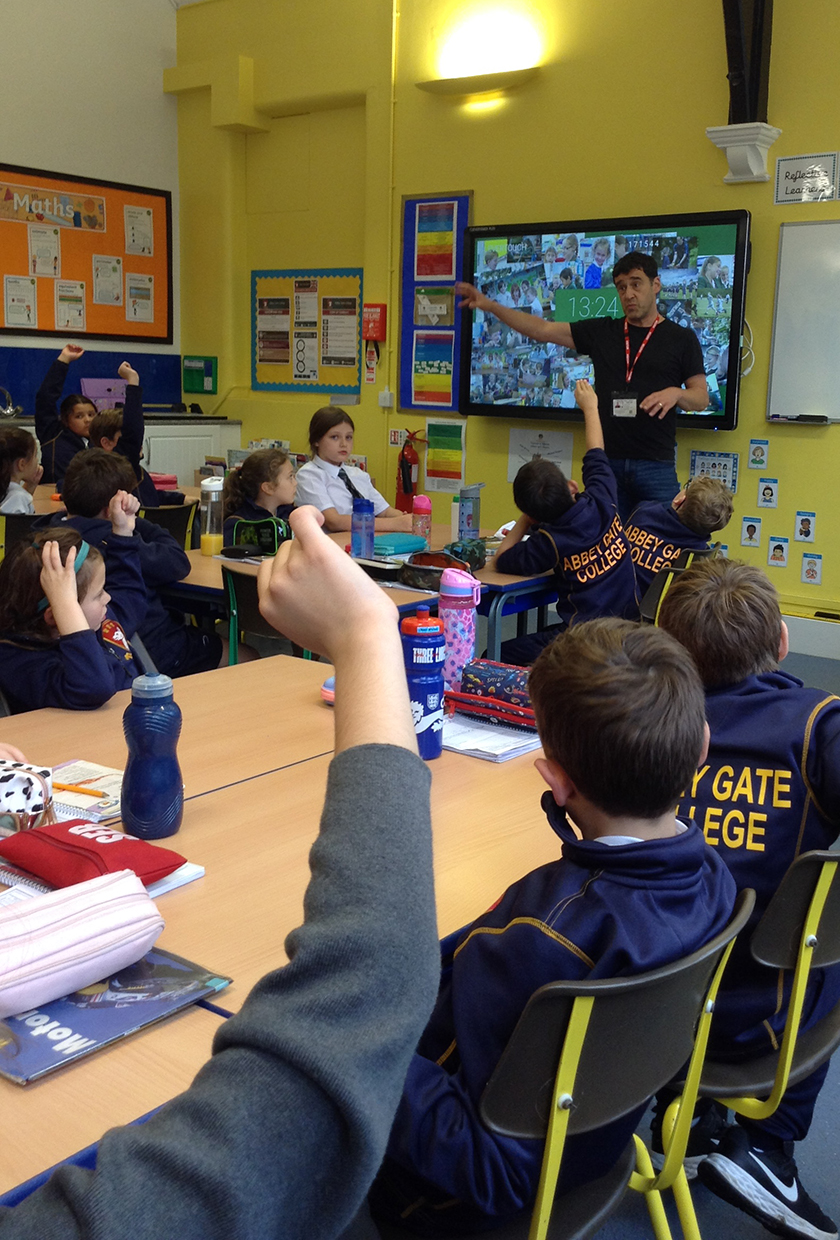
- Infant & Junior School
- Senior School
- College Information
- Terms and Conditions
- Request a prospectus
- Register Interest in Foundation to Year 11 (Ages 4-16)
- Register Interest in Sixth Form (Ages 17-18)
- Bursaries and Scholarships
- Transport routes
Abbey Gate College Saighton Grange, Chester, CH3 6EN
Infant & Junior School School Lane, Aldford, Chester, CH3 6HZ
T: 01244 332077 E: [email protected]

© Copyright 2024 Abbey Gate College Founded by: Deeside House Educational Trust Ltd, Company Reg. No: 01269507, Charity Reg. No: 273586
Website designed and built by Netfuel
- Welcome from the Head
- College History
- Virtual Tour
- Vision, Mission and Aims
- College Termly Magazine
- Our Governors
- Inspection Reports
- How to find us
- Outside the classroom
- Outside the Classroom
- Exam results
- Leavers Destinations
- Co Curricular Activities
- Parent Portal
Privacy Overview
Brooke Weston Academy
- News & Events
- Trips, Visits and Residentials
Author Tom Palmer visits BWA
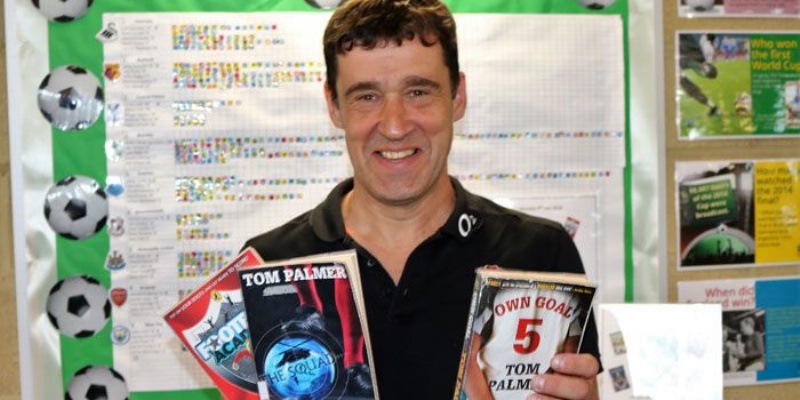
Author Tom Palmer spoke to Year 7 and 8 students at Brooke Weston Academy about his love of sport and his writing career.
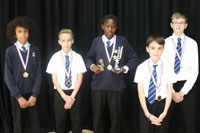
- News & Events
Author Tom Palmer Visits Princethorpe
.JPG)
Princethorpe College was delighted to welcome, award-winning author, Tom Palmer, to school on Thursday 12 May. Princethorpe’s Year 7 pupils have been studying Tom’s compelling story, After The War , in their English lessons, and they thrilled to meet the author himself.
Tom has written over 50 books, despite struggling with reading as a child. He began his career writing about sport and is well known for his Football Academy, Foul Play and The Squad series. He graduated on to war stories starting with Over the Line , a story about a professional footballer’s experience in the First World War and now has six stories loosely based on real life characters and events that engage both as history education as well as on a human level.
During an absorbing afternoon, Tom spoke openly to Year 7 pupils, discussing the inspiration behind his books. He shared his journey to becoming an author and answered a host of questions from our enthusiastic pupils. His down to earth and frank manner, drawing the children in.
Tom Palmer was clearly delighted with his appreciative audience and after his talk happily signed copies of his books for the children.
School Librarian and Teacher of Drama, Celia Scott, commented, “We were honoured to have Tom visit Princethorpe, he was just so interesting. Year 7 were mesmerised by his stories and bursting with questions. It was a fascinating afternoon for us all, and we just can’t wait to read Tom’s next book Resist. ”
Cookie Policy
This site uses cookies to store information on your computer. Click here for more information Allow Cookies Deny Cookies
Author Tom Palmer visit
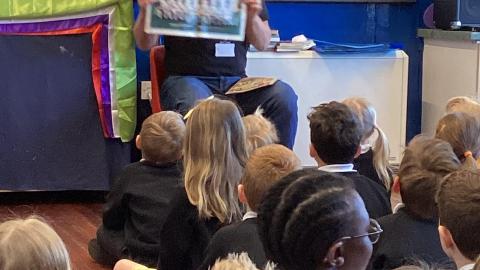
We were very lucky to have the fantastic author Tom Palmer visit our school and deliver an assembly and writing workshop.
In the assembly he explain all about the process about writing a narrative, the research and prep he puts into every book. He showed his brilliant scrap book that he created when writing his newest book Resist.
the children were surprised to learn that a famous author like Tom had been given some knock back in his career and some books he has written never got published but he had determination and didn't give up.
We were all very lucky to get our books signed by Tom Palmer in a meet and greet session!!
What an inspirational author !!!
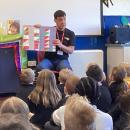
During our time with Tom, we learnt different techniques that Tom uses when he edits and improves his writing. Tom used one of our pieces of writing and modelled these 5 skills: addition (adding new words/phrases into the text), subtraction (removing unnecessary words), multiplication where you extend sentences to add more detail and division which involves identifying certain sentences that need to be shortened and divided into two separate sentences. He also taught us how to swap out words to improve our writing. He told us that when he wrote D-Day Dog, he must have edited and changed different aspects of his novel at least 52 times! This really inspired us to work on improving our writing and not to just accept the first draft that we write!
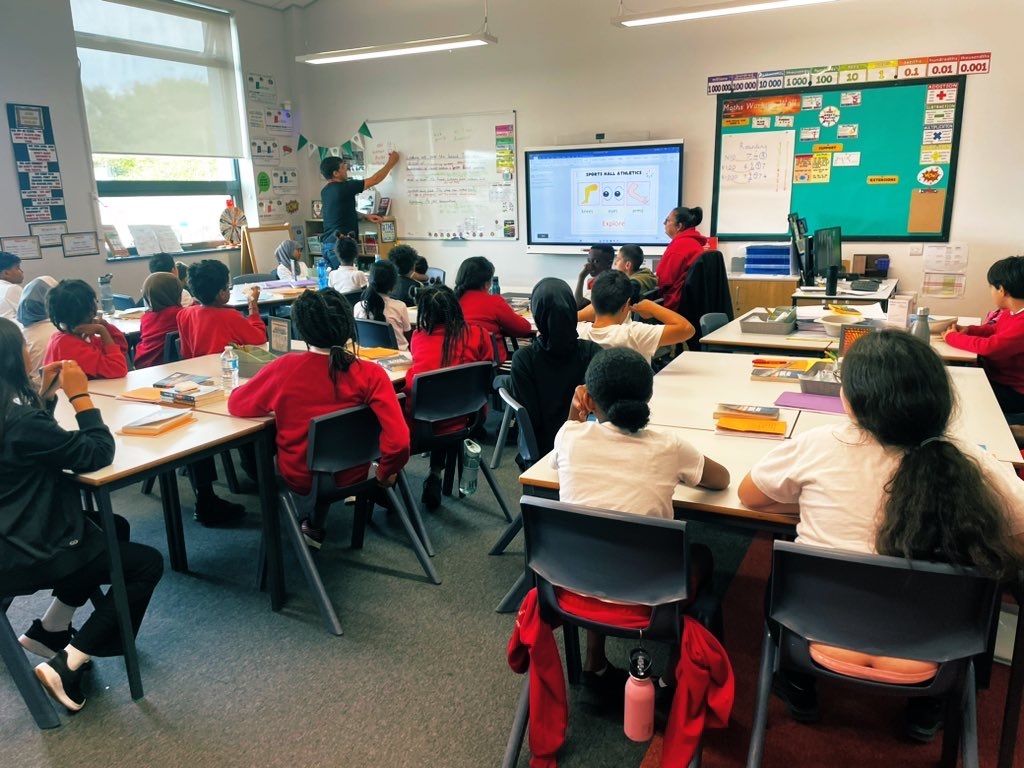
We were really inspired by Tom Palmer. Not only did we get to meet him in person, but he introduced a writing competition within our classes to write a setting description that links with a key moment/setting in hisa book 'D-Day Dog'. We're in the process of finishing these off and cannot wait to find out who may win!
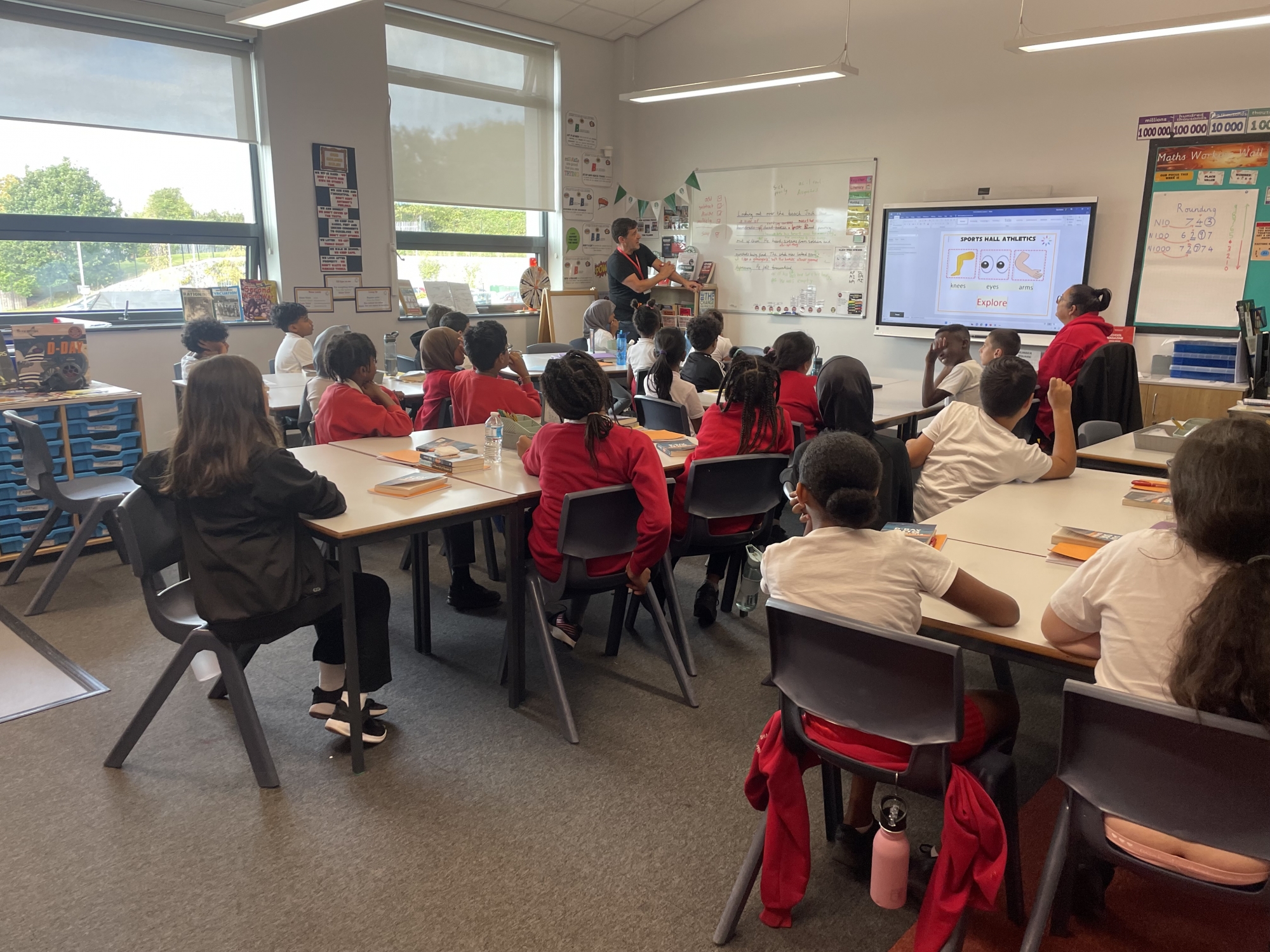
< Back to news
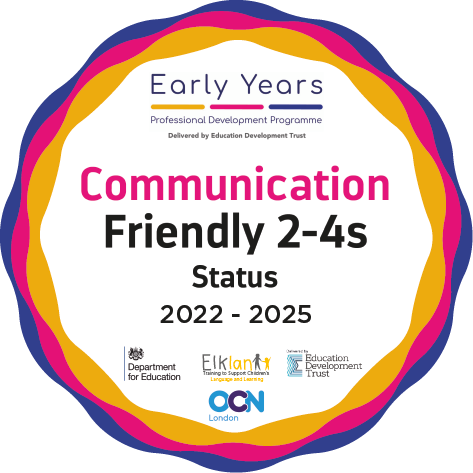
© 2024 Shakespeare Primary School
Website by The Specialists
Sitemap | Accessibility | Cookies Policy
Shakespeare Primary School and Nursery
Lincoln Road, Leeds, West Yorkshire LS9 7NP
Telephone: 0113 535 1000 Email: [email protected]
- Share full article
For more audio journalism and storytelling, download New York Times Audio , a new iOS app available for news subscribers.
The Crackdown on Student Protesters
Columbia university is at the center of a growing showdown over the war in gaza and the limits of free speech..
This transcript was created using speech recognition software. While it has been reviewed by human transcribers, it may contain errors. Please review the episode audio before quoting from this transcript and email [email protected] with any questions.
[TRAIN SCREECHING]
Well, you can hear the helicopter circling. This is Asthaa Chaturvedi. I’m a producer with “The Daily.” Just walked out of the 116 Street Station. It’s the main station for Columbia’s Morningside Heights campus. And it’s day seven of the Gaza solidarity encampment, where a hundred students were arrested last Thursday.
So on one side of Broadway, you see camera crews. You see NYPD officers all lined up. There’s barricades, steel barricades, caution tape. This is normally a completely open campus. And I’m able to — all members of the public, you’re able to walk through.
[NON-ENGLISH SPEECH]
Looks like international media is here.
Have your IDs out. Have your IDs out.
Students lining up to swipe in to get access to the University. ID required for entry.
Swipe your ID, please.
Hi, how are you, officer? We’re journalists with “The New York Times.”
You’re not going to get in, all right? I’m sorry.
Hi. Can I help please?
Yeah, it’s total lockdown here at Columbia.
Please have your IDs out ready to swipe.
From “The New York Times,” I’m Michael Barbaro. This is “The Daily.” Today, the story of how Columbia University has become the epicenter of a growing showdown between student protesters, college administrators, and Congress over the war in Gaza and the limits of free speech. I spoke with my colleague, Nick Fandos.
[UPBEAT MUSIC]
It’s Thursday, April 25.
Nick, if we rewind the clock a few months, we end up at a moment where students at several of the country’s best known universities are protesting Israel’s response to the October 7 attacks, its approach to a war in Gaza. At times, those protests are happening peacefully, at times with rhetoric that is inflammatory. And the result is that the leaders of those universities land before Congress. But the president of Columbia University, which is the subject we’re going to be talking about today, is not one of the leaders who shows up for that testimony.
That’s right. So the House Education Committee has been watching all these protests on campus. And the Republican Chairwoman decides, I’m going to open an investigation, look at how these administrations are handling it, because it doesn’t look good from where I sit. And the House last winter invites the leaders of several of these elite schools, Harvard, Penn, MIT, and Columbia, to come and testify in Washington on Capitol Hill before Congress.
Now, the President of Columbia has what turns out to be a very well-timed, pre-planned trip to go overseas and speak at an international climate conference. So Minouche Shafik isn’t going to be there. So instead, the presidents of Harvard, and Penn, and MIT show up. And it turned out to be a disaster for these universities.
They were asked very pointed questions about the kind of speech taking place on their campuses, and they gave really convoluted academic answers back that just baffled the committee. But there was one question that really embodied the kind of disconnect between the Committee — And it wasn’t just Republicans, Republicans and Democrats on the Committee — and these college presidents. And that’s when they were asked a hypothetical.
Does calling for the genocide of Jews violate Penn’s rules or code of conduct? Yes or no?
If the speech turns into conduct, it can be harassment.
And two of the presidents, Claudine Gay of Harvard and Elizabeth Magill of the University of Pennsylvania, they’re unwilling to say in this really kind of intense back and forth that this speech would constitute a violation of their rules.
It can be, depending on the context.
What’s the context?
Targeted at an individual. Is it pervasive?
It’s targeted at Jewish students, Jewish individuals. Do you understand your testimony is dehumanizing them?
And it sets off a firestorm.
It does not depend on the context. The answer is yes. And this is why you should resign. These are unacceptable answers across the board.
Members of Congress start calling for their resignations. Alumni are really, really ticked off. Trustees of the University start to wonder, I don’t know that these leaders really have got this under control. And eventually, both of them lose their jobs in a really high profile way.
Right. And as you’ve hinted at, for somewhat peculiar scheduling reasons, Columbia’s President escapes this disaster of a hearing in what has to be regarded as the best timing in the history of the American Academy.
Yeah, exactly. And Columbia is watching all this play out. And I think their first response was relief that she was not in that chair, but also a recognition that, sooner or later, their turn was going to come back around and they were going to have to sit before Congress.
Why were they so certain that they would probably end up before Congress and that this wasn’t a case of completely dodging a bullet?
Well, they remain under investigation by the committee. But also, as the winter wears on, all the same intense protests just continue unabated. So in many ways, Columbia’s like these other campuses. But in some ways, it’s even more intense. This is a university that has both one of the largest Jewish student populations of any of its peers. But it also has a large Arab and Muslim student population, a big Middle Eastern studies program. It has a dual degree program in Tel Aviv.
And it’s a university on top of all that that has a real history of activism dating back to the 1960s. So when students are recruited or choose to come to Columbia, they’re actively opting into a campus that prides itself on being an activist community. It’s in the middle of New York City. It’s a global place. They consider the city and the world, really, like a classroom to Columbia.
In other words, if any campus was going to be a hotbed of protest and debate over this conflict, it was going to be Columbia University.
Exactly. And when this spring rolls around, the stars finally align. And the same congressional committee issues another invitation to Minouche Shafik, Columbia’s President, to come and testify. And this time, she has no excuse to say no.
But presumably, she is well aware of exactly what testifying before this committee entails and is highly prepared.
Columbia knew this moment was coming. They spent months preparing for this hearing. They brought in outside consultants, crisis communicators, experts on anti-Semitism. The weekend before the hearing, she actually travels down to Washington to hole up in a war room, where she starts preparing her testimony with mock questioners and testy exchanges to prep her for this. And she’s very clear on what she wants to try to do.
Where her counterparts had gone before the committee a few months before and looked aloof, she wanted to project humility and competence, to say, I know that there’s an issue on my campus right now with some of these protests veering off into anti-Semitic incidents. But I’m getting that under control. I’m taking steps in good faith to make sure that we restore order to this campus, while allowing people to express themselves freely as well.
So then the day of her actual testimony arrives. And just walk us through how it goes.
The Committee on Education and Workforce will come to order. I note that —
So Wednesday morning rolls around. And President Shafik sits at the witness stand with two of her trustees and the head of Columbia’s new anti-Semitism task force.
Columbia stands guilty of gross negligence at best and at worst has become a platform for those supporting terrorism and violence against the Jewish people.
And right off the bat, they’re put through a pretty humbling litany of some of the worst hits of what’s been happening on campus.
For example, just four days after the harrowing October 7 attack, a former Columbia undergraduate beat an Israeli student with a stick.
The Republican Chairwoman of the Committee, Virginia Foxx, starts reminding her that there was a student who was actually hit with a stick on campus. There was another gathering more recently glorifying Hamas and other terrorist organizations, and the kind of chants that have become an everyday chorus on campus, which many Jewish students see as threatening. But when the questioning starts, President Shafik is ready. One of the first ones she gets is the one that tripped up her colleagues.
Does calling for the genocide of Jews violate Columbia’s code of conduct, Mr. Greenwald?
And she answers unequivocally.
Dr. Shafik?
Yes, it does.
And, Professor —
That would be a violation of Columbia’s rules. They would be punished.
As President of Columbia, what is it like when you hear chants like, by any means necessary or Intifada Revolution?
I find those chants incredibly distressing. And I wish profoundly that people would not use them on our campus.
And in some of the most interesting exchanges of the hearing, President Shafik actually opens Columbia’s disciplinary books.
We have already suspended 15 students from Columbia. We have six on disciplinary probation. These are more disciplinary actions that have been taken probably in the last decade at Columbia. And —
She talks about the number of students that have been suspended, but also the number of faculty that she’s had removed from the classroom that are being investigated for comments that either violate some of Columbia’s rules or make students uncomfortable. One case in particular really underscores this.
And that’s of a Middle Eastern studies professor named Joseph Massad. He wrote an essay not long after Hamas invaded Israel and killed 1,200 people, according to the Israeli government, where he described that attack with adjectives like awesome. Now, he said they’ve been misinterpreted, but a lot of people have taken offense to those comments.
Ms. Stefanik, you’re recognized for five minutes.
Thank you, Chairwoman. I want to follow up on my colleague, Rep Walberg’s question regarding Professor Joseph Massad. So let me be clear, President —
And so Representative Elise Stefanik, the same Republican who had tripped up Claudine Gay of Harvard and others in the last hearing, really starts digging in to President Shafik about these things at Columbia.
He is still Chair on the website. So has he been terminated as Chair?
Congresswoman, I —
And Shafik’s answers are maybe a little surprising.
— before getting back to you. I can confirm —
I know you confirmed that he was under investigation.
Yes, I can confirm that. But I —
Did you confirm he was still the Chair?
He says that Columbia is taking his case seriously. In fact, he’s under investigation right now.
Well, let me ask you this.
I need to check.
Will you make the commitment to remove him as Chair?
And when Stefanik presses her to commit to removing him from a campus leadership position —
I think that would be — I think — I would — yes. Let me come back with yes. But I think I — I just want to confirm his current status before I write —
We’ll take that as a yes, that you will confirm that he will no longer be chair.
Shafik seems to pause and think and then agree to it on the spot, almost like she is making administrative decisions with or in front of Congress.
Now, we did some reporting after the fact. And it turns out the Professor didn’t even realize he was under investigation. So he’s learning about this from the hearing too. So what this all adds up to, I think, is a performance so in line with what the lawmakers themselves wanted to hear, that at certain points, these Republicans didn’t quite know what to do with it. They were like the dog that caught the car.
Columbia beats Harvard and UPenn.
One of them, a Republican from Florida, I think at one point even marvelled, well, you beat Harvard and Penn.
Y’all all have done something that they weren’t able to do. You’ve been able to condemn anti-Semitism without using the phrase, it depends on the context. But the —
So Columbia’s president has passed this test before this committee.
Yeah, this big moment that tripped up her predecessors and cost them their jobs, it seems like she has cleared that hurdle and dispatched with the Congressional committee that could have been one of the biggest threats to her presidency.
Without objection, there being no further business, the committee stands adjourned. [BANGS GAVEL]
But back on campus, some of the students and faculty who had been watching the hearing came away with a very different set of conclusions. They saw a president who was so eager to please Republicans in Congress that she was willing to sell out some of the University’s students and faculty and trample on cherished ideas like academic freedom and freedom of expression that have been a bedrock of American higher education for a really long time.
And there was no clearer embodiment of that than what had happened that morning just as President Shafik was going to testify before Congress. A group of students before dawn set up tents in the middle of Columbia’s campus and declared themselves a pro-Palestinian encampment in open defiance of the very rules that Dr. Shafik had put in place to try and get these protests under control.
So these students in real-time are beginning to test some of the things that Columbia’s president has just said before Congress.
Exactly. And so instead of going to celebrate her successful appearance before Congress, Shafik walks out of the hearing room and gets in a black SUV to go right back to that war room, where she’s immediately confronted with a major dilemma. It basically boils down to this, she had just gone before Congress and told them, I’m going to get tough on these protests. And here they were. So either she gets tough and risks inflaming tension on campus or she holds back and does nothing and her words before Congress immediately look hollow.
And what does she decide?
So for the next 24 hours, she tries to negotiate off ramps. She consults with her Deans and the New York Police Department. And it all builds towards an incredibly consequential decision. And that is, for the first time in decades, to call the New York City Police Department onto campus in riot gear and break this thing up, suspend the students involved, and then arrest them.
To essentially eliminate this encampment.
Eliminate the encampment and send a message, this is not going to be tolerated. But in trying to quell the unrest, Shafik actually feeds it. She ends up leaving student protesters and the faculty who support them feeling betrayed and pushes a campus that was already on edge into a full blown crisis.
[SLOW TEMPO MUSIC]
After the break, what all of this has looked like to a student on Columbia’s campus. We’ll be right back.
[PHONE RINGS]
Is this Isabella?
Yes, this is she.
Hi, Isabella. It’s Michael Barbaro from “The Daily.”
Hi. Nice to meet you.
Earlier this week, we called Isabella Ramírez, the Editor in Chief of Columbia’s undergraduate newspaper, “The Columbia Daily Spectator,” which has been closely tracking both the protests and the University’s response to them since October 7.
So, I mean, in your mind, how do we get to this point? I wonder if you can just briefly describe the key moments that bring us to where we are right now.
Sure. Since October 7, there has certainly been constant escalation in terms of tension on campus. And there have been a variety of moves that I believe have distanced the student body, the faculty, from the University and its administration, specifically the suspension of Columbia’s chapters of Students for Justice in Palestine and Jewish Voice for Peace. And that became a huge moment in what was characterized as suppression of pro-Palestinian activism on campus, effectively rendering those groups, quote, unquote, unauthorized.
What was the college’s explanation for that?
They had cited in that suspension a policy which states that a demonstration must be approved within a certain window, and that there must be an advance notice, and that there’s a process for getting an authorized demonstration. But the primary point was this policy that they were referring to, which we later reported, was changed before the suspension.
So it felt a little ad hoc to people?
Yes, it certainly came as a surprise, especially at “Spectator.” We’re nerds of the University in the sense that we are familiar with faculty and University governance. But even to us, we had no idea where this policy was coming from. And this suspension was really the first time that it entered most students’ sphere.
Columbia’s campus is so known for its activism. And so in my time of being a reporter, of being an editor, I’ve overseen several protests. And I’ve never seen Columbia penalize a group for, quote, unquote, not authorizing a protest. So that was certainly, in our minds, unprecedented.
And I believe part of the justification there was, well, this is a different time. And I think that is a reasonable thing to say. But I think a lot of students, they felt it was particularly one-sided, that it was targeting a specific type of speech or a specific type of viewpoint. Although, the University, of course, in its explicit policies, did not outline, and was actually very explicit about not targeting specific viewpoints —
So just to be super clear, it felt to students — and it sounds like, journalistically, it felt to you — that the University was coming down in a uniquely one-sided way against students who were supporting Palestinian rights and may have expressed some frustrations with Israel in that moment.
Yes. Certainly —
Isabella says that this was just the beginning of a really tense period between student protesters and the University. After those two student groups were suspended, campus protests continued. Students made a variety of demands. They asked that the University divest from businesses that profit from Israel’s military operations in Gaza. But instead of making any progress, the protests are met with further crackdown by the University.
And so as Isabella and her colleagues at the college newspaper see it, there’s this overall chilling effect that occurs. Some students become fearful that if they participate in any demonstrations, they’re going to face disciplinary action. So fast forward now to April, when these student protesters learned that President Shafik is headed to Washington for her congressional testimony. It’s at this moment that they set out to build their encampment.
I think there was obviously a lot of intention in timing those two things. I think it’s inherently a critique on a political pressure and this congressional pressure that we saw build up against, of course, Claudine Gay at Harvard and Magill at UPenn. So I think a lot of students and faculty have been frustrated at this idea that there are not only powers at the University that are dictating what’s happening, but there are perhaps external powers that are also guiding the way here in terms of what the University feels like it must do or has to do.
And I think that timing was super crucial. Having the encampment happen on the Wednesday morning of the hearing was an incredible, in some senses, interesting strategy to direct eyes to different places.
All eyes were going to be on Shafik in DC. But now a lot of eyes are on New York. The encampment is set up in the middle of the night slash morning, prior to the hearing. And so what effectively happens is they caught Shafik when she wasn’t on campus, when a lot of senior administration had their resources dedicated to supporting Shafik in DC.
And you have all of those people not necessarily out of commission, but with their focus elsewhere. So the encampment is met with very little resistance at the beginning. There were public safety officers floating around and watching. But at the very beginning hours, I think there was a sense of, we did it.
[CHANTING]: Disclose! Divest! We will not stop! We will not rest. Disclose! Divest! We will not stop!
It would be quite surprising to anybody and an administrator to now suddenly see dozens of tents on this lawn in a way that I think very purposely puts an imagery of, we’re here to stay. As the morning evolved and congressional hearings continued —
Minouche Shafik, open your eyes! Use of force, genocide!
Then we started seeing University delegates that were coming to the encampment saying, you may face disciplinary action for continuing to be here. I think that started around almost — like 9:00 or 10:00 AM, they started handing out these code of conduct violation notices.
Hell no! Hell no! Hell no!
Then there started to be more public safety action and presence. So they started barricading the entrances. The day progressed, there was more threat of discipline. The students became informed that if they continue to stay, they will face potential academic sanctions, potential suspension.
The more they try to silence us, the louder we will be! The more they —
I think a lot of people were like, OK, you’re threatening us with suspension. But so what?
This is about these systems that Minouche Shafik, that the Board of Trustees, that Columbia University is complicit in.
What are you going to do to try to get us out of here? And that was, obviously, promptly answered.
This is the New York State Police Department.
We will not stop!
You are attempting participate in an unauthorized encampment. You will be arrested and charged with trespassing.
My phone blew up, obviously, from the reporters, from the editors, of saying, oh my god, the NYPD is on our campus. And as soon as I saw that, I came out. And I saw a huge crowd of students and affiliates on campus watching the lawns. And as I circled around that crowd, I saw the last end of the New York Police Department pulling away protesters and clearing out the last of the encampment.
[CHANTING]: We love you! We will get justice for you! We see you! We love you! We will get justice for you! We see you! We love you! We will get justice for you! We see you! We love you! We will get justice for you!
It was something truly unimaginable, over 100 students slash other individuals are arrested from our campus, forcefully removed. And although they were suspended, there was a feeling of traumatic event that has just happened to these students, but also this sense of like, OK, the worst of the worst that could have happened to us just happened.
And for those students who maybe couldn’t go back to — into campus, now all of their peers, who were supporters or are in solidarity, are — in some sense, it’s further emboldened. They’re now not just sitting on the lawns for a pro-Palestinian cause, but also for the students, who have endured quite a lot.
So the crackdown, sought by the president and enforced by the NYPD, ends up, you’re saying, becoming a galvanizing force for a broader group of Columbia students than were originally drawn to the idea of ever showing up on the center of campus and protesting?
Yeah, I can certainly speak to the fact that I’ve seen my own peers, friends, or even acquaintances, who weren’t necessarily previously very involved in activism and organizing efforts, suddenly finding themselves involved.
Can I — I just have a question for you, which is all journalism, student journalism or not student journalism, is a first draft of history. And I wonder if we think of this as a historic moment for Columbia, how you imagine it’s going to be remembered.
Yeah, there is no doubt in my mind that this will be a historic moment for Colombia.
I think that this will be remembered as a moment in which the fractures were laid bare. Really, we got to see some of the disunity of the community in ways that I have never really seen it before. And what we’ll be looking to is, where do we go from here? How does Colombia repair? How do we heal from all of this? so That is the big question in terms of what will happen.
Nick, Isabella Ramírez just walked us through what this has all looked like from the perspective of a Columbia student. And from what she could tell, the crackdown ordered by President Shafik did not quell much of anything. It seemed, instead, to really intensify everything on campus. I’m curious what this has looked like for Shafik.
It’s not just the students who are upset. You have faculty, including professors, who are not necessarily sympathetic to the protesters’ view of the war, who are really outraged about what Shafik has done here. They feel that she’s crossed a boundary that hasn’t been crossed on Columbia’s campus in a really long time.
And so you start to hear things by the end of last week like censure, no confidence votes, questions from her own professors about whether or not she can stay in power. So this creates a whole new front for her. And on top of it all, as this is going on, the encampment itself starts to reform tent-by-tent —
— almost in the same place that it was. And Shafik decides that the most important thing she could do is to try and take the temperature down, which means letting the encampment stand. Or in other words, leaning in the other direction. This time, we’re going to let the protesters have their say for a little while longer.
The problem with that is that, over the weekend, a series of images start to emerge from on campus and just off of it of some really troubling anti-Semitic episodes. In one case, a guy holds up a poster in the middle of campus and points it towards a group of Jewish students who are counter protesting. And it says, I’m paraphrasing here, Hamas’ next targets.
I saw an image of that. What it seemed to evoke was the message that Hamas should murder those Jewish students. That’s the way the Jewish students interpreted it.
It’s a pretty straightforward and jarring statement. At the same time, just outside of Columbia’s closed gates —
Stop killing children!
— protestors are showing up from across New York City. It’s hard to tell who’s affiliated with Columbia, who’s not.
Go back to Poland! Go back to Poland!
There’s a video that goes viral of one of them shouting at Jewish students, go back to Poland, go back to Europe.
In other words, a clear message, you’re not welcome here.
Right. In fact, go back to the places where the Holocaust was committed.
Exactly. And this is not representative of the vast majority of the protesters in the encampment, who mostly had been peaceful. They would later hold a Seder, actually, with some of the pro-Palestinian Jewish protesters in their ranks. But those videos are reaching members of Congress, the very same Republicans that Shafik had testified in front of just a few days before. And now they’re looking and saying, you have lost control of your campus, you’ve turned back on your word to us, and you need to resign.
They call for her outright resignation over this.
That’s right. Republicans in New York and across the country began to call for her to step down from her position as president of Columbia.
So Shafik’s dilemma here is pretty extraordinary. She has set up this dynamic where pleasing these members of Congress would probably mean calling in the NYPD all over again to sweep out this encampment, which would mean further alienating and inflaming students and faculty, who are still very upset over the first crackdown. And now both ends of this spectrum, lawmakers in Washington, folks on the Columbia campus, are saying she can’t lead the University over this situation before she’s even made any fateful decision about what to do with this second encampment. Not a good situation.
No. She’s besieged on all sides. For a while, the only thing that she can come up with to offer is for classes to go hybrid for the remainder of the semester.
So students who aren’t feeling safe in this protest environment don’t necessarily have to go to class.
Right. And I think if we zoom out for a second, it’s worth bearing in mind that she tried to choose a different path here than her counterparts at Harvard or Penn. And after all of this, she’s kind of ended up in the exact same thicket, with people calling for her job with the White House, the Mayor of New York City, and others. These are Democrats. Maybe not calling on her to resign quite yet, but saying, I don’t know what’s going on your campus. This does not look good.
That reality, that taking a different tack that was supposed to be full of learnings and lessons from the stumbles of her peers, the fact that didn’t really work suggests that there’s something really intractable going on here. And I wonder how you’re thinking about this intractable situation that’s now arrived on these college campuses.
Well, I don’t think it’s just limited to college campuses. We have seen intense feelings about this conflict play out in Hollywood. We’ve seen them in our politics in all kinds of interesting ways.
In our media.
We’ve seen it in the media. But college campuses, at least in their most idealized form, are something special. They’re a place where students get to go for four years to think in big ways about moral questions, and political questions, and ideas that help shape the world they’re going to spend the rest of their lives in.
And so when you have a question that feels as urgent as this war does for a lot of people, I think it reverberates in an incredibly intense way on those campuses. And there’s something like — I don’t know if it’s quite a contradiction of terms, but there’s a collision of different values at stake. So universities thrive on the ability of students to follow their minds and their voices where they go, to maybe even experiment a little bit and find those things.
But there are also communities that rely on people being able to trust each other and being able to carry out their classes and their academic endeavors as a collective so they can learn from one another. So in this case, that’s all getting scrambled. Students who feel strongly about the Palestinian cause feel like the point is disruption, that something so big, and immediate, and urgent is happening that they need to get in the faces of their professors, and their administrators, and their fellow students.
Right. And set up an encampment in the middle of campus, no matter what the rules say.
Right. And from the administration’s perspective, they say, well, yeah, you can say that and you can think that. And that’s an important process. But maybe there’s some bad apples in your ranks. Or though you may have good intentions, you’re saying things that you don’t realize the implications of. And they’re making this environment unsafe for others. Or they’re grinding our classes to a halt and we’re not able to function as a University.
So the only way we’re going to be able to move forward is if you will respect our rules and we’ll respect your point of view. The problem is that’s just not happening. Something is not connecting with those two points of view. And as if that’s not hard enough, you then have Congress and the political system with its own agenda coming in and putting its thumb on a scale of an already very difficult situation.
Right. And at this very moment, what we know is that the forces that you just outlined have created a dilemma, an uncertainty of how to proceed, not just for President Shafik and the students and faculty at Columbia, but for a growing number of colleges and universities across the country. And by that, I mean, this thing that seemed to start at Columbia is literally spreading.
Absolutely. We’re talking on a Wednesday afternoon. And these encampments have now started cropping up at universities from coast-to-coast, at Harvard and Yale, but also at University of California, at the University of Texas, at smaller campuses in between. And at each of these institutions, there’s presidents and deans, just like President Shafik at Columbia, who are facing a really difficult set of choices. Do they call in the police? The University of Texas in Austin this afternoon, we saw protesters physically clashing with police.
Do they hold back, like at Harvard, where there were dramatic videos of students literally running into Harvard yard with tents. They were popping up in real-time. And so Columbia, really, I think, at the end of the day, may have kicked off some of this. But they are now in league with a whole bunch of other universities that are struggling with the same set of questions. And it’s a set of questions that they’ve had since this war broke out.
And now these schools only have a week or two left of classes. But we don’t know when these standoffs are going to end. We don’t know if students are going to leave campus for the summer. We don’t know if they’re going to come back in the fall and start protesting right away, or if this year is going to turn out to have been an aberration that was a response to a really awful, bloody war, or if we’re at the beginning of a bigger shift on college campuses that will long outlast this war in the Middle East.
Well, Nick, thank you very much. Thanks for having me, Michael.
We’ll be right back.
Here’s what else you need to know today. The United Nations is calling for an independent investigation into two mass graves found after Israeli forces withdrew from hospitals in Gaza. Officials in Gaza said that some of the bodies found in the graves were Palestinians who had been handcuffed or shot in the head and accused Israel of killing and burying them. In response, Israel said that its soldiers had exhumed bodies in one of the graves as part of an effort to locate Israeli hostages.
And on Wednesday, Hamas released a video of Hersh Goldberg-Polin, an Israeli-American dual citizen, whom Hamas has held hostage since October 7. It was the first time that he has been shown alive since his captivity began. His kidnapping was the subject of a “Daily” episode in October that featured his mother, Rachel. In response to Hamas’s video, Rachel issued a video of her own, in which she spoke directly to her son.
And, Hersh, if you can hear this, we heard your voice today for the first time in 201 days. And if you can hear us, I am telling you, we are telling you, we love you. Stay strong. Survive.
Today’s episode was produced by Sydney Harper, Asthaa Chaturvedi, Olivia Natt, Nina Feldman, and Summer Thomad, with help from Michael Simon Johnson. It was edited by Devon Taylor and Lisa Chow, contains research help by Susan Lee, original music by Marion Lozano and Dan Powell, and was engineered by Chris Wood. Our theme music is by Jim Brunberg and Ben Landsverk of Wonderly. That’s it for “The Daily.” I’m Michael Barbaro. See you tomorrow.

- April 26, 2024 • 21:50 Harvey Weinstein Conviction Thrown Out
- April 25, 2024 • 40:33 The Crackdown on Student Protesters
- April 24, 2024 • 32:18 Is $60 Billion Enough to Save Ukraine?
- April 23, 2024 • 30:30 A Salacious Conspiracy or Just 34 Pieces of Paper?
- April 22, 2024 • 24:30 The Evolving Danger of the New Bird Flu
- April 19, 2024 • 30:42 The Supreme Court Takes Up Homelessness
- April 18, 2024 • 30:07 The Opening Days of Trump’s First Criminal Trial
- April 17, 2024 • 24:52 Are ‘Forever Chemicals’ a Forever Problem?
- April 16, 2024 • 29:29 A.I.’s Original Sin
- April 15, 2024 • 24:07 Iran’s Unprecedented Attack on Israel
- April 14, 2024 • 46:17 The Sunday Read: ‘What I Saw Working at The National Enquirer During Donald Trump’s Rise’
- April 12, 2024 • 34:23 How One Family Lost $900,000 in a Timeshare Scam
Hosted by Michael Barbaro
Featuring Nicholas Fandos
Produced by Sydney Harper , Asthaa Chaturvedi , Olivia Natt , Nina Feldman and Summer Thomad
With Michael Simon Johnson
Edited by Devon Taylor and Lisa Chow
Original music by Marion Lozano and Dan Powell
Engineered by Chris Wood
Listen and follow The Daily Apple Podcasts | Spotify | Amazon Music
Columbia University has become the epicenter of a growing showdown between student protesters, college administrators and Congress over the war in Gaza and the limits of free speech.
Nicholas Fandos, who covers New York politics and government for The Times, walks us through the intense week at the university. And Isabella Ramírez, the editor in chief of Columbia’s undergraduate newspaper, explains what it has all looked like to a student on campus.
On today’s episode
Nicholas Fandos , who covers New York politics and government for The New York Times
Isabella Ramírez , editor in chief of The Columbia Daily Spectator

Background reading
Inside the week that shook Columbia University .
The protests at the university continued after more than 100 arrests.
There are a lot of ways to listen to The Daily. Here’s how.
We aim to make transcripts available the next workday after an episode’s publication. You can find them at the top of the page.
Research help by Susan Lee .
The Daily is made by Rachel Quester, Lynsea Garrison, Clare Toeniskoetter, Paige Cowett, Michael Simon Johnson, Brad Fisher, Chris Wood, Jessica Cheung, Stella Tan, Alexandra Leigh Young, Lisa Chow, Eric Krupke, Marc Georges, Luke Vander Ploeg, M.J. Davis Lin, Dan Powell, Sydney Harper, Mike Benoist, Liz O. Baylen, Asthaa Chaturvedi, Rachelle Bonja, Diana Nguyen, Marion Lozano, Corey Schreppel, Rob Szypko, Elisheba Ittoop, Mooj Zadie, Patricia Willens, Rowan Niemisto, Jody Becker, Rikki Novetsky, John Ketchum, Nina Feldman, Will Reid, Carlos Prieto, Ben Calhoun, Susan Lee, Lexie Diao, Mary Wilson, Alex Stern, Dan Farrell, Sophia Lanman, Shannon Lin, Diane Wong, Devon Taylor, Alyssa Moxley, Summer Thomad, Olivia Natt, Daniel Ramirez and Brendan Klinkenberg.
Our theme music is by Jim Brunberg and Ben Landsverk of Wonderly. Special thanks to Sam Dolnick, Paula Szuchman, Lisa Tobin, Larissa Anderson, Julia Simon, Sofia Milan, Mahima Chablani, Elizabeth Davis-Moorer, Jeffrey Miranda, Renan Borelli, Maddy Masiello, Isabella Anderson and Nina Lassam.
Nicholas Fandos is a Times reporter covering New York politics and government. More about Nicholas Fandos
Advertisement

OUR MINISTER
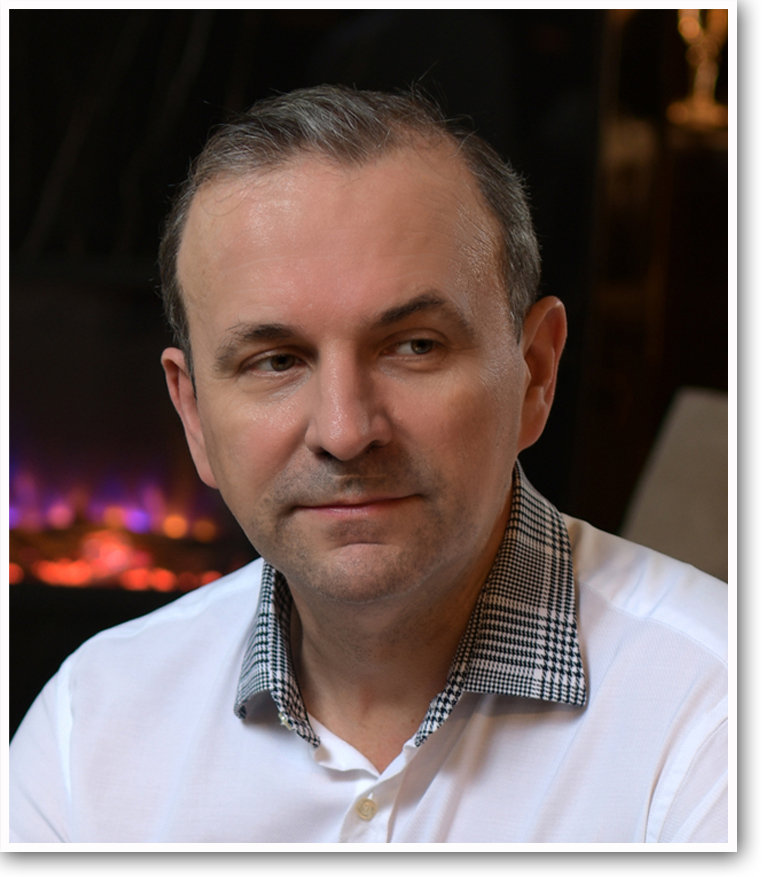
Dr. Joseph Lozovyy was born into a Christian family in Elektrostal, Moscow Region, and was raised in a pastor’s home. From the age of fifteen, he began actively participating in the music ministry of the Baptist Church in Mytishchi, where his father served as a pastor, and also played in the orchestra of the Central Moscow Baptist Church. From 1989, he participated in various evangelistic events in different cities of Moscow Region and beyond. From 1989 to 1992, as a member of the choir and orchestra “LOGOS,” he participated in evangelistic and charitable concerts, repeatedly performing on the stages of the Moscow State Conservatory, the Bolshoi Theatre, and other concert halls in Russia and abroad. In 1992, his family moved to the United States. In 2007, after completing a full course of spiritual and academic preparation, Joseph moved to Dallas, Texas, to engage in church ministry. In 2008, he founded the Russian Bible Church to preach to the Russian-speaking population living in Dallas, Texas.
– Bachelor of Arts in Music (viola) from the Third Moscow Music School named after Scriabin, Russia (1987-1991)
– Master of Theology (Th.M); Dallas Theological Seminary, Texas (1999-2003);
– Doctor of Philosophy (Ph.D) Hebrew Bible (Books of Samuel): University of Edinburgh, Scotland, United Kingdom (2007).
– Doctoral research (2004-2005) Tübingen, Germany.
– Author of a theological work published in English: Saul, Doeg, Nabal and the “Son of Jesse: Readings in 1 Samuel 16-25, LHBOTS 497 [T&T Clark/Continuum: Bloomsbury Publishing]).
https://www.bloomsbury.com/us/saul-doeg-nabal-and-the-son-of-jesse-9780567027535/
Joseph and his wife Violetta and their son Nathanael live in the northern part of Dallas.
Saul, Doeg, Nabal, and the “Son of Jesse”: Readings in 1 Samuel 16-25: The Library of Hebrew Bible/Old Testament Studies Joseph Lozovyy T&T Clark (bloomsbury.com)
Joseph, his wife Violetta and their son Nathaniel live in North Dallas, Texas where he continues ministering to Russian-speaking Christians and his independent accademic research.
Published Work
1. bloomsbury:, 2. buy at christian book distributors:, 3. buy on amazon:.


Turn Your Curiosity Into Discovery
Latest facts.
13 Facts About Brain Tumor Awareness Month US May
13 Facts About Community Garden Week Apr 1st To Apr 7th
40 facts about elektrostal.
Written by Lanette Mayes
Modified & Updated: 02 Mar 2024
Reviewed by Jessica Corbett

Elektrostal is a vibrant city located in the Moscow Oblast region of Russia. With a rich history, stunning architecture, and a thriving community, Elektrostal is a city that has much to offer. Whether you are a history buff, nature enthusiast, or simply curious about different cultures, Elektrostal is sure to captivate you.
This article will provide you with 40 fascinating facts about Elektrostal, giving you a better understanding of why this city is worth exploring. From its origins as an industrial hub to its modern-day charm, we will delve into the various aspects that make Elektrostal a unique and must-visit destination.
So, join us as we uncover the hidden treasures of Elektrostal and discover what makes this city a true gem in the heart of Russia.
Key Takeaways:
- Elektrostal, known as the “Motor City of Russia,” is a vibrant and growing city with a rich industrial history, offering diverse cultural experiences and a strong commitment to environmental sustainability.
- With its convenient location near Moscow, Elektrostal provides a picturesque landscape, vibrant nightlife, and a range of recreational activities, making it an ideal destination for residents and visitors alike.
Known as the “Motor City of Russia.”
Elektrostal, a city located in the Moscow Oblast region of Russia, earned the nickname “Motor City” due to its significant involvement in the automotive industry.
Home to the Elektrostal Metallurgical Plant.
Elektrostal is renowned for its metallurgical plant, which has been producing high-quality steel and alloys since its establishment in 1916.
Boasts a rich industrial heritage.
Elektrostal has a long history of industrial development, contributing to the growth and progress of the region.
Founded in 1916.
The city of Elektrostal was founded in 1916 as a result of the construction of the Elektrostal Metallurgical Plant.
Located approximately 50 kilometers east of Moscow.
Elektrostal is situated in close proximity to the Russian capital, making it easily accessible for both residents and visitors.
Known for its vibrant cultural scene.
Elektrostal is home to several cultural institutions, including museums, theaters, and art galleries that showcase the city’s rich artistic heritage.
A popular destination for nature lovers.
Surrounded by picturesque landscapes and forests, Elektrostal offers ample opportunities for outdoor activities such as hiking, camping, and birdwatching.
Hosts the annual Elektrostal City Day celebrations.
Every year, Elektrostal organizes festive events and activities to celebrate its founding, bringing together residents and visitors in a spirit of unity and joy.
Has a population of approximately 160,000 people.
Elektrostal is home to a diverse and vibrant community of around 160,000 residents, contributing to its dynamic atmosphere.
Boasts excellent education facilities.
The city is known for its well-established educational institutions, providing quality education to students of all ages.
A center for scientific research and innovation.
Elektrostal serves as an important hub for scientific research, particularly in the fields of metallurgy, materials science, and engineering.
Surrounded by picturesque lakes.
The city is blessed with numerous beautiful lakes, offering scenic views and recreational opportunities for locals and visitors alike.
Well-connected transportation system.
Elektrostal benefits from an efficient transportation network, including highways, railways, and public transportation options, ensuring convenient travel within and beyond the city.
Famous for its traditional Russian cuisine.
Food enthusiasts can indulge in authentic Russian dishes at numerous restaurants and cafes scattered throughout Elektrostal.
Home to notable architectural landmarks.
Elektrostal boasts impressive architecture, including the Church of the Transfiguration of the Lord and the Elektrostal Palace of Culture.
Offers a wide range of recreational facilities.
Residents and visitors can enjoy various recreational activities, such as sports complexes, swimming pools, and fitness centers, enhancing the overall quality of life.
Provides a high standard of healthcare.
Elektrostal is equipped with modern medical facilities, ensuring residents have access to quality healthcare services.
Home to the Elektrostal History Museum.
The Elektrostal History Museum showcases the city’s fascinating past through exhibitions and displays.
A hub for sports enthusiasts.
Elektrostal is passionate about sports, with numerous stadiums, arenas, and sports clubs offering opportunities for athletes and spectators.
Celebrates diverse cultural festivals.
Throughout the year, Elektrostal hosts a variety of cultural festivals, celebrating different ethnicities, traditions, and art forms.
Electric power played a significant role in its early development.
Elektrostal owes its name and initial growth to the establishment of electric power stations and the utilization of electricity in the industrial sector.
Boasts a thriving economy.
The city’s strong industrial base, coupled with its strategic location near Moscow, has contributed to Elektrostal’s prosperous economic status.
Houses the Elektrostal Drama Theater.
The Elektrostal Drama Theater is a cultural centerpiece, attracting theater enthusiasts from far and wide.
Popular destination for winter sports.
Elektrostal’s proximity to ski resorts and winter sport facilities makes it a favorite destination for skiing, snowboarding, and other winter activities.
Promotes environmental sustainability.
Elektrostal prioritizes environmental protection and sustainability, implementing initiatives to reduce pollution and preserve natural resources.
Home to renowned educational institutions.
Elektrostal is known for its prestigious schools and universities, offering a wide range of academic programs to students.
Committed to cultural preservation.
The city values its cultural heritage and takes active steps to preserve and promote traditional customs, crafts, and arts.
Hosts an annual International Film Festival.
The Elektrostal International Film Festival attracts filmmakers and cinema enthusiasts from around the world, showcasing a diverse range of films.
Encourages entrepreneurship and innovation.
Elektrostal supports aspiring entrepreneurs and fosters a culture of innovation, providing opportunities for startups and business development.
Offers a range of housing options.
Elektrostal provides diverse housing options, including apartments, houses, and residential complexes, catering to different lifestyles and budgets.
Home to notable sports teams.
Elektrostal is proud of its sports legacy, with several successful sports teams competing at regional and national levels.
Boasts a vibrant nightlife scene.
Residents and visitors can enjoy a lively nightlife in Elektrostal, with numerous bars, clubs, and entertainment venues.
Promotes cultural exchange and international relations.
Elektrostal actively engages in international partnerships, cultural exchanges, and diplomatic collaborations to foster global connections.
Surrounded by beautiful nature reserves.
Nearby nature reserves, such as the Barybino Forest and Luchinskoye Lake, offer opportunities for nature enthusiasts to explore and appreciate the region’s biodiversity.
Commemorates historical events.
The city pays tribute to significant historical events through memorials, monuments, and exhibitions, ensuring the preservation of collective memory.
Promotes sports and youth development.
Elektrostal invests in sports infrastructure and programs to encourage youth participation, health, and physical fitness.
Hosts annual cultural and artistic festivals.
Throughout the year, Elektrostal celebrates its cultural diversity through festivals dedicated to music, dance, art, and theater.
Provides a picturesque landscape for photography enthusiasts.
The city’s scenic beauty, architectural landmarks, and natural surroundings make it a paradise for photographers.
Connects to Moscow via a direct train line.
The convenient train connection between Elektrostal and Moscow makes commuting between the two cities effortless.
A city with a bright future.
Elektrostal continues to grow and develop, aiming to become a model city in terms of infrastructure, sustainability, and quality of life for its residents.
In conclusion, Elektrostal is a fascinating city with a rich history and a vibrant present. From its origins as a center of steel production to its modern-day status as a hub for education and industry, Elektrostal has plenty to offer both residents and visitors. With its beautiful parks, cultural attractions, and proximity to Moscow, there is no shortage of things to see and do in this dynamic city. Whether you’re interested in exploring its historical landmarks, enjoying outdoor activities, or immersing yourself in the local culture, Elektrostal has something for everyone. So, next time you find yourself in the Moscow region, don’t miss the opportunity to discover the hidden gems of Elektrostal.
Q: What is the population of Elektrostal?
A: As of the latest data, the population of Elektrostal is approximately XXXX.
Q: How far is Elektrostal from Moscow?
A: Elektrostal is located approximately XX kilometers away from Moscow.
Q: Are there any famous landmarks in Elektrostal?
A: Yes, Elektrostal is home to several notable landmarks, including XXXX and XXXX.
Q: What industries are prominent in Elektrostal?
A: Elektrostal is known for its steel production industry and is also a center for engineering and manufacturing.
Q: Are there any universities or educational institutions in Elektrostal?
A: Yes, Elektrostal is home to XXXX University and several other educational institutions.
Q: What are some popular outdoor activities in Elektrostal?
A: Elektrostal offers several outdoor activities, such as hiking, cycling, and picnicking in its beautiful parks.
Q: Is Elektrostal well-connected in terms of transportation?
A: Yes, Elektrostal has good transportation links, including trains and buses, making it easily accessible from nearby cities.
Q: Are there any annual events or festivals in Elektrostal?
A: Yes, Elektrostal hosts various events and festivals throughout the year, including XXXX and XXXX.
Was this page helpful?
Our commitment to delivering trustworthy and engaging content is at the heart of what we do. Each fact on our site is contributed by real users like you, bringing a wealth of diverse insights and information. To ensure the highest standards of accuracy and reliability, our dedicated editors meticulously review each submission. This process guarantees that the facts we share are not only fascinating but also credible. Trust in our commitment to quality and authenticity as you explore and learn with us.
Share this Fact:
- FanNation FanNation FanNation
- SI.COM SI.COM SI.COM
- SI Swimsuit SI Swimsuit SI Swimsuit
- SI Sportsbook SI Sportsbook SI Sportsbook
- SI Tickets SI Tickets SI Tickets
- SI Showcase SI Showcase SI Showcase
- SI Resorts SI Resorts SI Resorts
- NEWSLETTER NEWSLETTER NEWSLETTER
© Brooks Holton / USA TODAY NETWORK
2025 4-Star Guard to Potentially Visit Michigan State
Jerry Easter, a class of 2025 4-star guard from La Lumiere School, is considering visiting Michigan State.
- Author: Aidan Champion
In this story:
Michigan State men's basketball and Coach Tom Izzo continue to make progress in the 2025 recruiting class.
According to Jamie Shaw of On3, 2025 four-star guard Jerry Easter is considering a visit to Michigan State.
Easter, a 6-foot-4 combo guard who will be entering his senior year at La Lumiere School/IN, is the No. 28 player in the 2025 On3 Industry Ranking.
Per Shaw, "Easter averaged 18.2 points and 5.9 rebounds playing on Nike's EYBL Scholastic Circuit this high school season."
According to 247Sports, Easter has nearly 40 offers, including Michigan State's fellow Big Ten rivals (current and soon-to-be) Illinois, Ohio State, UCLA, USC, Oregon, Michigan, and Washington.
Easter told Shaw he has already officially visited Oregon and Georgia Tech and is "going to look at visits to Ohio State and Michigan State next school year."
“It’s Coach (Tom) Izzo for me," Shaw said of his interest in the Spartans . "Every time I go there for an unofficial visit, he is just fun to be around. He has so much energy. I went to a couple of games and he just brings a lot of energy on and off the court, I like that about him. I like how he coached AJ Hoggard and Tyson Walker. Coach Izzo is a legendary coach. I’m definitely considering Michigan State as well, they have a high profile and a great coaching staff.”
That's some notable praise for the legendary Spartans coach.
Understandably, the Spartans don't have any 2025 commits yet, but they have some great talent coming from the class of 2024.
Jase Richardson, their top 2024 recruit and 247Sports' No. 4 combo guard in the country, is the son of Michigan State basketball legend Jason Richardson. Next is four-star shooting guard Kur Teng and three-star power forward Jesse McCulloch.
Izzo will have his hands full with the competition surrounding Easter's recruitment, but if development is what is catching the young guard's eye, Izzo is his guy. Hoggard and Walker are only two of some of Michigan State's best guards in recent seasons, and there could even be more before Easter moves on to the college level.
Don’t forget to follow the official Spartan Nation Page on Facebook Spartan Nation WHEN YOU CLICK RIGHT HERE , and be a part of our vibrant community group Go Green Go White as well WHEN YOU CLICK RIGHT HERE .
Latest Spartan News
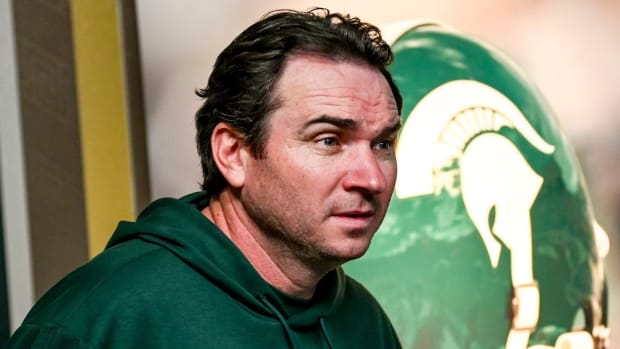
MSU Football Goes Bowling in 247Sports' Way-Too-Early Big Ten Predictions
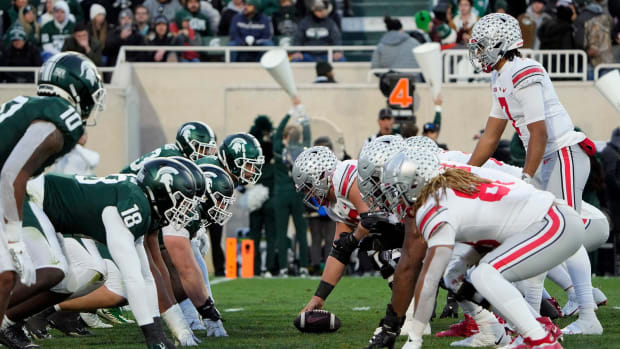
Ranking Michigan State Football's 2024 Opponents via SP+ Ratings
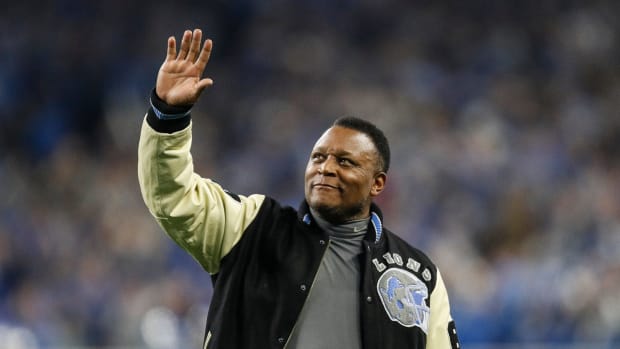
Detroit Lions legend Barry Sanders says he's "absolutely" a Michigan State fan
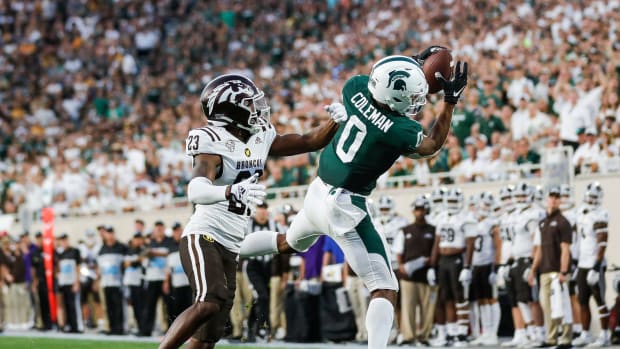
Former Michigan State WR Keon Coleman Returns to Breslin Center on 'Senior Day'
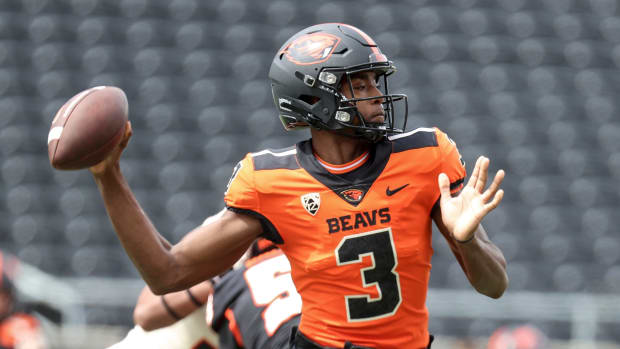
Heisman Trophy Odds Released for Michigan State QB Aidan Chiles
- History of cooperation
- Areas of cooperation
- Procurement policy
- Useful links
- Becoming a supplier
- Procurement
- Rosatom newsletter
© 2008–2024Valtiollinen Rosatom-ydinvoimakonserni

- Rosatom Global presence
- Rosatom in region
- For suppliers
- Preventing corruption
- Press centre
Rosatom Starts Life Tests of Third-Generation VVER-440 Nuclear Fuel
- 16 June, 2020 / 13:00
This site uses cookies. By continuing your navigation, you accept the use of cookies. For more information, or to manage or to change the cookies parameters on your computer, read our Cookies Policy. Learn more

IMAGES
COMMENTS
School visits with Tom Palmer. One of the best bits about being a children's author is visiting schools. It's fun. I learn a lot about what children like to read. And I do my best to encourage children to write with confidence and read for pleasure. For a few years I've been performing my Football Reading Game (and a rugby version too ...
"Tom Palmer is a true reading hero and has been responsible for motivating many thousands of young people to get into books ... AVAILABILITY : Virtual & In Person Author Visits Sandringham School. I am delighted to be still going into schools this term for in-person author visits and have availability from Autumn 2024.
I am now taking bookings for Historical Fiction author visits. I can offer a mix to suit you of : assemblies. presentations. workshops. virtual visits. writing-history-with-the-imperial-war-museum. I have been working in schools and libraries, promoting reading, for over ten years; specialising in motivating boys to read.
TOM PALMER WORKSHOP OPTIONS For virtual visits or in person Tom Palmer is the author of 50 award-winning children's books, covering spy, crime, ghost, sport and history genres. He can visit schools in person - sticking to your strict social distancing guidelines - or visit virtually, working with single classes or larger groups. He has ...
Children's author Tom Palmer shares his experience of returning to schools and his top tips for schools and authors who are thinking about arranging a visit this term. COVID-19 presents huge and unprecedented challenges to schools and authors alike.
Tom Palmer, top children's author, visits Hope Valley College to spend a day with Year 7 and 8 students. ... Millionaires', a certain amount of cake, and finally a mad dash to meet another train en route to his next school visit in the Midlands. It was a brilliant day, much enjoyed by all, including Tom. Reluctant readers were inspired ...
Author, Tom Palmer, visits Latymer. 3 November 2022. A huge thanks to popular children's author, Tom Palmer, who visited us yesterday and received a warm welcome from our Year 7 students. ... including developing free teaching resources for the National Literacy Trust for schools to use with his novels for special events, such as Holocaust ...
On Friday, King's welcome the acclaimed author Tom Palmer to talk to the pupils in Years 3-6. It was an inspiring afternoon, where pupils listened to Tom's tales of how he got into writing, despite initially being a reluctant reader himself. Everyone was enthralled by his tales of how he got into writing, by writing about what he loved ...
Browse Tom Palmer's best-selling audiobooks and newest titles. Discover more authors you'll love listening to on Audible. ... Tom visits over 150 schools every year to run his Football and Rugby Reading Games, which tie in with his long-term work in reader development. From 2019 his range of school events will include history workshops ...
Tom Palmer. Bestselling children's author and Carnegie Medal 2020 nominee Tom Palmer visited Grasmere School this week. Tom had asked if the children would like to work with him on the draft of ...
We were delighted to have the acclaimed author, Tom Palmer visit the Prep on Wednesday 25 May to talk about his writing to all pupils. Tom is known for his historical fiction and football books. His most recent book Arctic Star is about three young naval recruits braving the Arctic Convoys during the Second World War.It follows his award-winning book After the War - from Auschwitz to ...
Author Tom Palmer Visits Infant and Junior School Published on 17th November 2022. The amazing author, Tom Palmer visited our Infant and Junior School on Thursday 20 October. Tom is the author of 57 books for children including three Puffin series, as well as books for Barrington Stoke (which are dyslexia friendly and promote reading for all).
Author Tom Palmer spoke to Year 7 and 8 students at Brooke Weston Academy about his love of sport and his writing career. ... Tom, who writes for children aged from 5 to 15, has since sold around 400,000 books and he also does up to three school visits a week. It can take anything from a fortnight to four months to complete his books and he ...
I visit hundreds of schools, libraries, bookshops, museums and festivals every year. If you can't make it to meet me and would like a signed and dedciated copy of one of my books, please contact my local independent children's bookshop, The Thoughtful Spot and they will help you out. Dates for your diary in 2024
Tom Palmer was clearly delighted with his appreciative audience and after his talk happily signed copies of his books for the children. School Librarian and Teacher of Drama, Celia Scott, commented, "We were honoured to have Tom visit Princethorpe, he was just so interesting. Year 7 were mesmerised by his stories and bursting with questions.
Author Tom Palmer visit. We were very lucky to have the fantastic author Tom Palmer visit our school and deliver an assembly and writing workshop. In the assembly he explain all about the process about writing a narrative, the research and prep he puts into every book. He showed his brilliant scrap book that he created when writing his newest ...
When Tom Palmer arrived on Friday 22 nd September, all of Year 6 were excited as we were going to meet a real-life author; the author of the book we have been reading in our English lessons this half-term (D-Day Dog)! Whilst he was with us, he talked about the first ever book he wrote - a book about football. This was because, at the time, he was (and still is) obsessed with watching and ...
Imagine if when Detroit made the most cars in the US, if they had decided to just rename the city into Vehicle-Ville and made a flag showing a T-model being assembled.
The Crackdown on Student Protesters. Columbia University is at the center of a growing showdown over the war in Gaza and the limits of free speech. April 25, 2024, 6:00 a.m. ET. Share full article ...
- Bachelor of Arts in Music (viola) from the Third Moscow Music School named after Scriabin, Russia (1987-1991) - Master of Theology (Th.M); Dallas Theological Seminary, Texas (1999-2003); - Doctor of Philosophy (Ph.D) Hebrew Bible (Books of Samuel): University of Edinburgh, Scotland, United Kingdom (2007).
40 Facts About Elektrostal. Elektrostal is a vibrant city located in the Moscow Oblast region of Russia. With a rich history, stunning architecture, and a thriving community, Elektrostal is a city that has much to offer. Whether you are a history buff, nature enthusiast, or simply curious about different cultures, Elektrostal is sure to ...
According to Jamie Shaw of On3, 2025 four-star guard Jerry Easter is considering a visit to Michigan State. Easter, a 6-foot-4 combo guard who will be entering his senior year at La Lumiere School ...
The life tests started after successful completion of hydraulic tests (hydraulic filling) of the mock-up with the aim to determine RK3+ hydraulic resistance. Life tests are carried out on a full-scale research hot run-in test bench V-440 and will last for full 1500 hours. The aim of tests is to study mechanical stability of RK3+ components ...